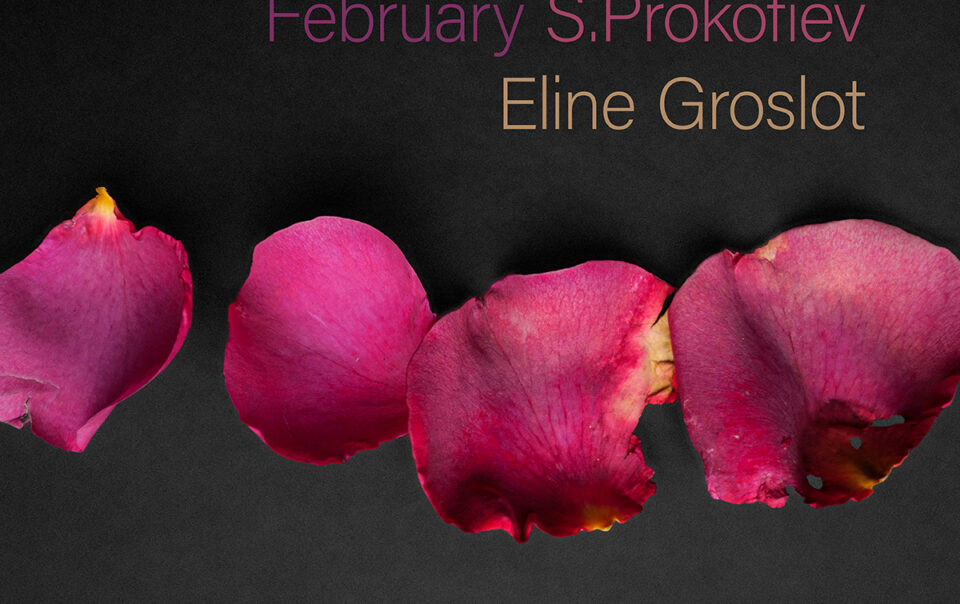(english below)
Muziek is de mooiste liefdestaal die er is, zo wist ook Sergei Prokofiev.
Prokofiev onderhield zijn hele leven correspondentie met diegenen die hem steunden en leidden in zijn leven, om er enkele te noemen: Sergey Eisenstein-filmdirecteur, Jascha Heifetz-violist, Serge Koussevitsky-dirigent, Sergei Diaghilev-Ballets Russes, maar ook met geliefden zoals Eleonora Damskaya-harpiste.
Damskaya was een klasgenote van Prokofiev aan het conservatorium van Sint Petersburg en op weg om een gevierde harpiste te worden, beter bekend onder de naam van haar echtgenoot Eleonora Tontegoda.
Prokofiev was tot over zijn oren verliefd op de mooie, intelligente en welbespraakte Eleonora en maakte dit duidelijk door in de periode 1912 – mei 1918(wanneer hij besluit de USSR te verlaten) ettelijke (humoristische) brieven, postkaarten en poëzie aan haar te richten.
In de ultieme taal van de liefde draagt hij zijn Prelude opus 12 n°7 (uit Ten pieces for piano) en Piece for harp op aan Damskaya, maar ook in zijn reeks Visions fugitives blijkt n°7 ‘Harp’ een verwijzing naar de jonge Eleonora.
Helaas zal de Bolsjewistische revolutie en de emigratie van Prokofiev ervoor zorgen dat hun wegen voor lange tijd gescheiden worden, maar ze blijven schrijven: hij vertelt haar over het succes van ‘haar’ Prelude in Engeland en Amerika, zij schrijft hem dat ze zijn Schröder piano gered heeft uit revolutionaire handen.
Wanneer Prokofiev in 1934 naar Moskou terugkeert en ze elkaar eindelijk weerzien, was de liefde niet bekoeld, negen maanden later werd Alexander (Prokofiev) Tontegoda geboren.
De Prelude behoort sinds lange tijd tot het harp repertoire, maar van n°7 uit Visions fugitives wordt wel eens gezegd dat het niet overleefd als compositie uit de context van het geheel der Mimoletnosti(Russische naam van de bundel).
Toch koos ik ervoor om deze 2 te bundelen, omdat voor mij de gedachte van waaruit ze geschreven werden (nl. als liefdesverklaring) al te mooi is om niet aan te wenden. Bovendien vormt de uiterst melodische Prelude met zijn gebroken akkoorden en glissandi een prachtig contrast met het harmonisch complexere en bijna melodieloze ‘Harp’ uit Visions.
In zijn balletten, opera’s, filmmuziek en symfonieën worden we als harpist goed bedeeld, maar een absoluut hoogtepunt is toch wel ‘Ode to the end of the war’ voor 4 piano’s, militaire band, contrabas percussie en 8!!!!! harpen.
Listen to : Prelude and ‘Harp’ by Sergei Prokofiev
Music is the most beautiful language of love, also Sergei Prokofiev knew that.
His whole life Prokofiev maintained correspondence with those who supported and endorsed his career, to name a few: Sergey Eisenstein-film director, Jascha Heifetz-violinist, Serge Koussevitsky-conductor, Sergei Diaghilev-Ballets Russes, but also his great love Eleonora Damskaya-harpist.
Damskaya was Prokofiev’s classmate at the St Petersburg’s Conservatory and on her way of becoming a celebrated harpist, better known under her married name Eleonora Tontegoda.
Prokofiev was infatuated by the beautiful, intelligent and eloquent Eleonora and expressed his feelings by writing numerous (humorous) letters, postcards and poetry over the years 1912-may 1918, when he had opted to leave Russia.
He pours his amorous feelings into music and dedicates his Prelude opus 12 n°7 (from Ten pieces for piano) and Piece for harp to Damskaya, but also n°7 ‘Harp’ out of ‘Visions fugitives’ refers to the young Eleonora.
Unfortunately, the Bolshevik revolution and the emigration of Prokofiev will prohibit them being together for most of their lives, but they continue writing each other: he informs her about the great successes ‘her’ Prelude enjoys in Engeland and America and she reports him that she was able to save his Schröder piano out of revolutionary hands.
Upon his return to Moscou in 1934, they met again and their passion was still very much alive, nine months later Alexander (Prokofiev) Tontegoda was born.
The Prelude has been part of the harp repertoire for a long time, but n°7 from Visions fugitives is sometimes describe as being too fragile to survive on its own out of the context of the whole of Mimoletnosti. (the Russian name for this anthology)
However I chose to combine these 2, because for me the sentiment of pure love in which there were written is too beautiful to ignore. Furthermore the very melodic Prelude with its broken chords and glissandi makes a wonderful antithesis with the harmonic complexity and almost melody lacking ‘harp’ from Visions.
In his ballets, opera’s, film music and symphonic work we are provided with great harp parts, but the icing on the cake is definitely ‘Ode to the end of the war’ for 4 piano’s, military band, double bass, percussion and 8!!!!!harps.

